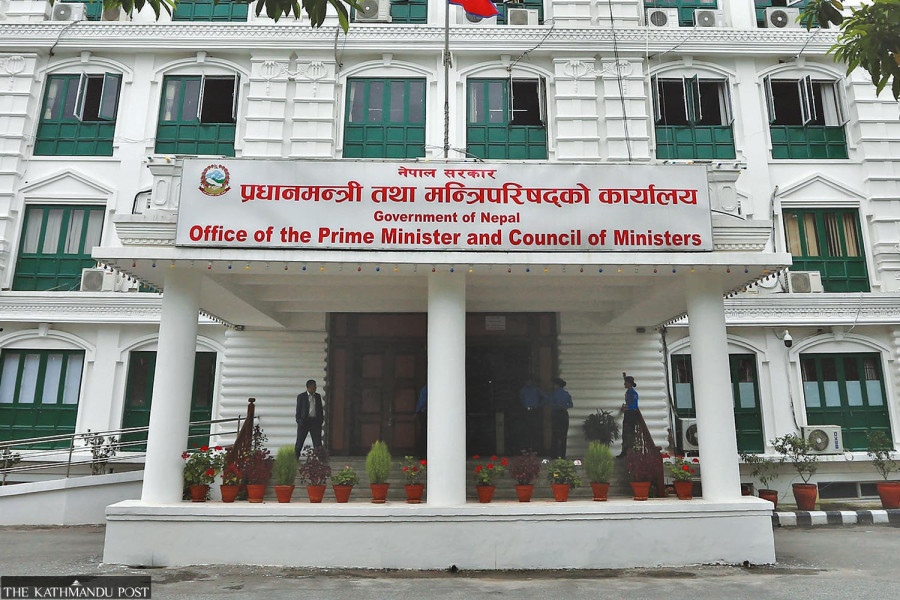National
Cabinet moves to proceed with criminalising predatory lending
Decides to amend the criminal code. Although the existing civil code allows victims to file a case against unscrupulous lending, the law does not specifically mention such lending.
Post Report
Amid mounting pressure to take action against predatory lending that is widespread in the Tarai and has devastated many families, the government on Tuesday officially decided to amend the law to criminalise the practice.
A Cabinet meeting took the decision after hundreds of loan sharking victims came to the Capital by travelling on foot for 11 days from different districts of Tarai to draw the government’s attention to their plight. They also protested at Maitighar on Tuesday.
On Monday, the victims marched in front of the Tundikhel Khula Manch demanding legal actions against loan sharks.
Minister of Communications Rekha Sharma said Tuesday’s meeting has decided to proceed with the process to amend the National Criminal Procedure (Code) Act-2017 to declare the practice of loan-sharking a crime and punish those involved.
Ahead of the cabinet meeting, the private secretariat of Prime Minister Pushpa Kamal Dahal released a publicity material on social media listing out ten measures taken by the prime minister and his secretariat to address the grievances of the loan-sharking victims. Several political parties have expressed their solidarity with the demands of the victims.
“The meeting has decided to amend the criminal code and an amendment proposal to this effect will be forwarded to the Bills Committee of the Cabinet for further discussion,” a minister told the Post.
A few months ago, a six-member Home Ministry task force led by joint secretary Bhishma Kumar Bhusal had advised the government to amend some laws including the criminal code, criminal code act, civil code and civil code acts to criminalise unscrupulous lending.
Although the existing civil code allows victims to file a case against predatory lending, the law does not specifically mention such lending.
Currently, loan-sharking is essentially categorised as an offence under the civil code, although acts such as blackmailing, extortion and other exploitations fall under criminal offence. As a result, the victims have to fight the deep-pocketed loan sharks alone.
“Besides amending the civil and criminal laws and codes, we have also proposed a work procedure on how to ascertain whether any loan falls under predatory lending,” Bhusal said.
Although the current law says interest per year on household financial transactions should exceed more than 10 percent, the law does not specifically define loan-sharking.
If the law is amended, it will open the way for the government to investigate and prosecute moneylenders involved in predatory lending.
The protesting victims have been demanding that the government make arrangements to provide them loans at lower interest rates, bring laws against unscrupulous lending and scrap personal mortgaging contracts known as Tamasuk. The loan-sharking victims returned to Kathmandu six months after signing a five-point agreement with the government in September last year after which they had ended their protest.
According to the Bhusal task force report, loan sharks tend to file court cases based on the documents borrowers signed on terms dictated by loan sharks.
The loan sharks were found to have filed cases against the victims to recover their loans while the victims were often denied access to the court process.
According to the Ministry of Home Affairs, over 3,351 complaints have been registered across the country against loan sharking practices. This number could go up significantly if the government specifically criminalises predatory lending practices. Of them, the district administration offices have cleared 346 complaints. As many as 774 are under consideration at DAOs, 525 complaints are under the jurisdiction of courts, the police are dealing with 850 complaints, and no action has been taken on the remaining 1,181 complaints.
“There are hundreds more such cases at several district administration offices, district police offices and other police units,” a joint secretary at the home ministry said, adding, “Some cases need to be handled by courts.”
On Tuesday, the government formed a four-member team headed by the joint secretary at the Home Ministry Rudra Devi Sharma to hold talks with the protesting victims.
Home Ministry undersecretary Dil Kumar Tamang, undersecretary at the Office of Prime Minister and Council of Ministers Uma Kanta Adhikari, and undersecretary at the Ministry of Law, Justice and Parliamentary Affairs Jung Bahadur Dangi are members of the talks team.
The Bhusal task force report has called for legal action against loan sharks who prepare multiple versions of their transactions and charge higher than reasonable interest rates.
According to the task force's report, other factors also made the legal fight against loan sharks challenging for the victims. The victims signing documents prepared by loan sharks; victims putting up lands as collateral or transferring land ownership in the name of loan sharks to get a loan; the lender not giving a receipt of the loan even after the loan has been repaid; the victims’ fear of court procedures; weak defence by victims in the court on the accusations made by the loan sharks; and the proxies of loan sharks buying collateralised lands while the lands are auctioned off—they are all challenges against ensuring justice for the victims.
“It will take some time to address these issues,” said Kedar Nath Sharma, joint secretary at the Ministry of Home Affairs, said, adding, “Because several laws need to be addressed.”
“After we reached an understanding with the victims last September, some progress was made towards addressing the problem. We will discuss the role being played by the chief district officers in some districts,” said Adhikari.




 16.12°C Kathmandu
16.12°C Kathmandu













